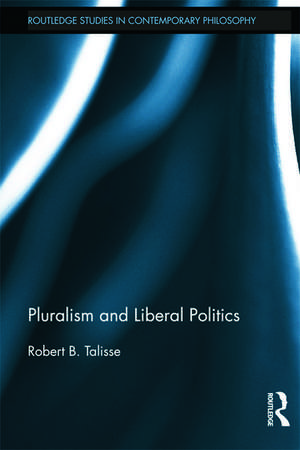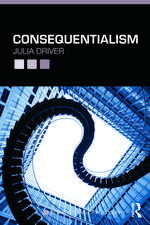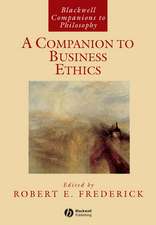Pluralism and Liberal Politics: Routledge Studies in Contemporary Philosophy
Autor Robert Talisseen Limba Engleză Paperback – 21 mar 2013
According to this view, certain value conflicts are at present undecidable rather than intrinsic. Consequently, epistemic pluralism countenances the possibility that further argumentation, enhanced reflection, or the acquisition of more information could yield rational resolutions to the kinds of value conflicts that metaphysical pluralists deem irresolvable as such. Talisse’s epistemic pluralism hence prescribes a politics in which deep value conflicts are to be addressed by ongoing argumentation and free engagement among citizens; the epistemic pluralist thus sees liberal democracy is the proper political response to ongoing moral disagreement.
| Toate formatele și edițiile | Preț | Express |
|---|---|---|
| Paperback (1) | 481.58 lei 6-8 săpt. | |
| Taylor & Francis – 21 mar 2013 | 481.58 lei 6-8 săpt. | |
| Hardback (1) | 1057.05 lei 6-8 săpt. | |
| Taylor & Francis – 25 aug 2011 | 1057.05 lei 6-8 săpt. |
Din seria Routledge Studies in Contemporary Philosophy
-
 Preț: 310.31 lei
Preț: 310.31 lei -
 Preț: 309.90 lei
Preț: 309.90 lei -
 Preț: 311.22 lei
Preț: 311.22 lei -
 Preț: 304.04 lei
Preț: 304.04 lei -
 Preț: 310.88 lei
Preț: 310.88 lei - 9%
 Preț: 903.32 lei
Preț: 903.32 lei - 8%
 Preț: 391.85 lei
Preț: 391.85 lei - 9%
 Preț: 1003.54 lei
Preț: 1003.54 lei -
 Preț: 312.90 lei
Preț: 312.90 lei -
 Preț: 313.34 lei
Preț: 313.34 lei -
 Preț: 310.16 lei
Preț: 310.16 lei -
 Preț: 307.69 lei
Preț: 307.69 lei - 9%
 Preț: 936.25 lei
Preț: 936.25 lei -
 Preț: 311.41 lei
Preț: 311.41 lei -
 Preț: 310.84 lei
Preț: 310.84 lei -
 Preț: 311.41 lei
Preț: 311.41 lei -
 Preț: 381.07 lei
Preț: 381.07 lei - 9%
 Preț: 935.87 lei
Preț: 935.87 lei - 9%
 Preț: 1107.23 lei
Preț: 1107.23 lei - 18%
 Preț: 1114.98 lei
Preț: 1114.98 lei - 18%
 Preț: 1112.21 lei
Preț: 1112.21 lei - 18%
 Preț: 1058.43 lei
Preț: 1058.43 lei - 18%
 Preț: 1055.51 lei
Preț: 1055.51 lei -
 Preț: 387.16 lei
Preț: 387.16 lei - 18%
 Preț: 1120.20 lei
Preț: 1120.20 lei - 18%
 Preț: 1057.13 lei
Preț: 1057.13 lei - 18%
 Preț: 1112.83 lei
Preț: 1112.83 lei - 18%
 Preț: 1058.69 lei
Preț: 1058.69 lei - 18%
 Preț: 1108.73 lei
Preț: 1108.73 lei - 18%
 Preț: 1111.55 lei
Preț: 1111.55 lei - 18%
 Preț: 1051.90 lei
Preț: 1051.90 lei - 18%
 Preț: 1109.78 lei
Preț: 1109.78 lei - 18%
 Preț: 1110.11 lei
Preț: 1110.11 lei - 18%
 Preț: 1052.35 lei
Preț: 1052.35 lei - 18%
 Preț: 1055.32 lei
Preț: 1055.32 lei -
 Preț: 481.58 lei
Preț: 481.58 lei - 18%
 Preț: 1111.87 lei
Preț: 1111.87 lei - 18%
 Preț: 1113.16 lei
Preț: 1113.16 lei - 18%
 Preț: 1115.69 lei
Preț: 1115.69 lei - 18%
 Preț: 1061.57 lei
Preț: 1061.57 lei - 18%
 Preț: 1053.95 lei
Preț: 1053.95 lei - 18%
 Preț: 1117.43 lei
Preț: 1117.43 lei - 18%
 Preț: 1059.84 lei
Preț: 1059.84 lei - 18%
 Preț: 1062.98 lei
Preț: 1062.98 lei - 18%
 Preț: 1064.70 lei
Preț: 1064.70 lei - 18%
 Preț: 1221.12 lei
Preț: 1221.12 lei - 18%
 Preț: 1108.24 lei
Preț: 1108.24 lei - 18%
 Preț: 1119.16 lei
Preț: 1119.16 lei - 18%
 Preț: 1060.25 lei
Preț: 1060.25 lei - 18%
 Preț: 897.16 lei
Preț: 897.16 lei
Preț: 481.58 lei
Nou
Puncte Express: 722
Preț estimativ în valută:
92.15€ • 96.21$ • 76.27£
92.15€ • 96.21$ • 76.27£
Carte tipărită la comandă
Livrare economică 04-18 aprilie
Preluare comenzi: 021 569.72.76
Specificații
ISBN-13: 9780415704052
ISBN-10: 0415704057
Pagini: 196
Dimensiuni: 152 x 229 x 11 mm
Greutate: 0.27 kg
Ediția:1
Editura: Taylor & Francis
Colecția Routledge
Seria Routledge Studies in Contemporary Philosophy
Locul publicării:Oxford, United Kingdom
ISBN-10: 0415704057
Pagini: 196
Dimensiuni: 152 x 229 x 11 mm
Greutate: 0.27 kg
Ediția:1
Editura: Taylor & Francis
Colecția Routledge
Seria Routledge Studies in Contemporary Philosophy
Locul publicării:Oxford, United Kingdom
Public țintă
Postgraduate and UndergraduateCuprins
1. Introduction: Pluralism and Political Theory 2. Two Metaphysical Pluralists: Berlin and James 3. Classical Pragmatism and Pluralism 4. From Pluralism to Politics: Four Neo-Berlinian Proposals 5. Value Pluralism as an Account of Value 6. Towards a New Pragmatist Political Theory 7. Can (Political) Liberals Take Their Own Side in an Argument? 8. Religion and Politics
Recenzii
"In this provocative book Talisse scrutinises the thesis of value pluralism and its alleged relationship with liberalism. [He] should be commended for writing a stimulating and provocative book that is crammed with a plethora of refreshingly pithy arguments." --Edward Hall, Political Studies Review
"[A] fascinating book, containing a wealth of argument. Talisse presents a strong challenge to value pluralists and pragmatists alike, and the book represents a much-needed corrective to common assumptions about the supposedly natural link between pluralism and liberalism. Pluralism and Liberal Politics ought to be read by anyone with an interest in contemporary debates about pluralism and political liberalism." --Jethro Butler, Plurilogue
"Talisse’s argument is ingenious...this is a remarkable work". - Andrew F. Smith, Journal of Moral Philosophy
"[A] fascinating book, containing a wealth of argument. Talisse presents a strong challenge to value pluralists and pragmatists alike, and the book represents a much-needed corrective to common assumptions about the supposedly natural link between pluralism and liberalism. Pluralism and Liberal Politics ought to be read by anyone with an interest in contemporary debates about pluralism and political liberalism." --Jethro Butler, Plurilogue
"Talisse’s argument is ingenious...this is a remarkable work". - Andrew F. Smith, Journal of Moral Philosophy
Descriere
In this book, Robert Talisse critically examines the moral and political implications of pluralism, the view that our best moral thinking is indeterminate and that moral conflict is an inescapable feature of the human condition. Through a careful engagement with the work of William James, Isaiah Berlin, John Rawls, and their contemporary followers, Talisse distinguishes two broad types of moral pluralism: metaphysical and epistemic. After arguing that metaphysical pluralism does not offer a compelling account of value and thus cannot ground a viable conception of liberal politics, Talisse proposes and defends a distinctive variety of epistemic pluralism. According to this view, certain value conflicts are at present undecidable rather than intrinsic. Consequently, epistemic pluralism countenances the possibility that further argumentation, enhanced reflection, or the acquisition of more information could yield rational resolutions to the kinds of value conflicts that metaphysical pluralists deem irresolvable as such. Talisse’s epistemic pluralism hence prescribes a politics in which deep value conflicts are to be addressed by ongoing argumentation and free engagement among citizens; the epistemic pluralist thus sees liberal democracy is the proper political response to ongoing moral disagreement. While developing his view, Talisse engages central issues in contemporary liberal political theory, including toleration, state neutrality, public justification, and the accommodation of illiberal sub-cultures. This book will be of interest to ethicists, political philosophers, and political scientists.
















